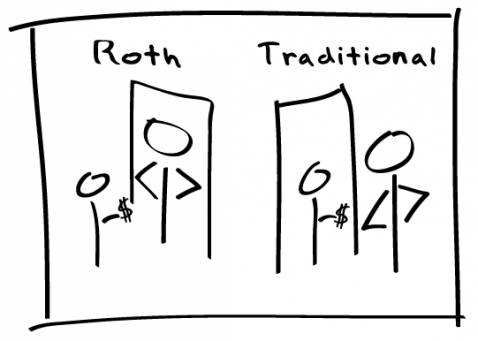In our first look at the Roth vs. the Traditional IRA, we saw that based on raw math alone, the Traditional IRA performs closer to the Roth than many tend to think.
However, there are many other perks of a Roth that are lesser-known but could be the deciding factor for you when the time comes for you to choose between the two.
Let’s take a look at the 3 “secret” perks of the Roth.
1. Free withdrawal of contributions
With a Traditional IRA, if you try to withdraw any of your funds before your retirement age of 59 ½, you’ll not only have to pay tax on the money but also be subject to a 10% penalty.
With a Roth, since you’ve already paid tax on the money that you have contributed, you can withdraw your contributions freely. The only money you can’t withdraw without penalty from the account is any growth (interest) that has accrued.
So, if you contributed $10,000 to your Roth, and it grew to $11,000, only the $1,000 of growth would be unavailable for withdrawal.
Now, I wouldn’t recommend often dipping into your retirement account to pay off random bills that pop up. You should have an emergency fund for that. But, it does bring a certain peace of mind to know that in an absolute emergency, if you had to get access to the money, you could.
There’s an element of security that comes with the Roth due to the liquidity of the funds that you just don’t get with a Traditional IRA.
Every dollar you contribute to your Roth kind of feels like a contribution to your retirement AND a further guarantee that you’re never going to have to go into debt to pay off an emergency.
And that’s a wonderful feeling that frankly can’t be measured with a dollar sign.
2. Under certain circumstances, free withdrawal of your growth
Yes, you read that right. With a Roth, there are even times that you can withdraw some of your growth, in addition to your contributions.
The most notable example is a special first-time homebuyer clause, which allows first-time homebuyers to withdraw up to $10,000 from their Roth with no penalty.
This is a fantastic perk!
But, there are even a few more situations where you are allowed to withdraw both contributions and growth from your account.
According to Bankrate, those situations are:
- Permanent disability
- Unreimbursed medical expenses that exceed 10 percent of adjusted gross income
- Back taxes
- Paying health insurance premiums while unemployed
When it comes to early withdrawals, a ROTH IRA is simply much more flexible and forgiving.
3. No age limits on contributions or distributions
A Traditional IRA has 2 age-related mandates:
- You must stop contributing at age 70 ½
- You must begin receiving distributions (withdrawals) at age 70 ½.
With a Roth, neither of these rules apply.
Contribution and distribution flexibility
You can wait as long as you want to start receiving distributions, and you can continue to contribute as long as you want, as long as you are continuing to earn income.
Again, this just gives you more flexibility.
If you happen to have other funds that you prefer to tap before you begin pulling from your Roth, you can do that. Or, if it happens to be a down year for the market, you don’t have to sell off your equities at a loss. You can hold onto them until the market rebounds.
Estate planning flexibility
Or, finally, if you’re someone who has done well enough financially that you won’t need your Roth money at all during your retirement years, you can just let your heirs’ inheritance continue to grow throughout your life.
Speaking of your heirs, while non-spouse beneficiaries of a Roth (your kids or other family members) are required to immediately begin taking an annual minimum distribution, spouses are exempt from this rule.
This means if your spouse inherits your Roth, he or she can wait as long as they want to begin taking distributions.
Conclusion:
So, there you have it, the 3 “secret” perks of the Roth.
Does this mean that the Roth is the best option for everyone? No. There are definitely situations where a Traditional IRA could be a better option for someone, especially for higher-income earners.
But if one or more of the perks listed above seem attractive to you, then the Roth just might be the best option for your personal situation.

